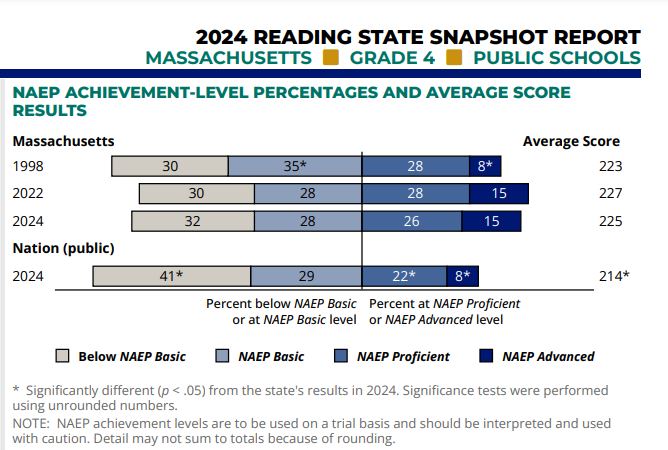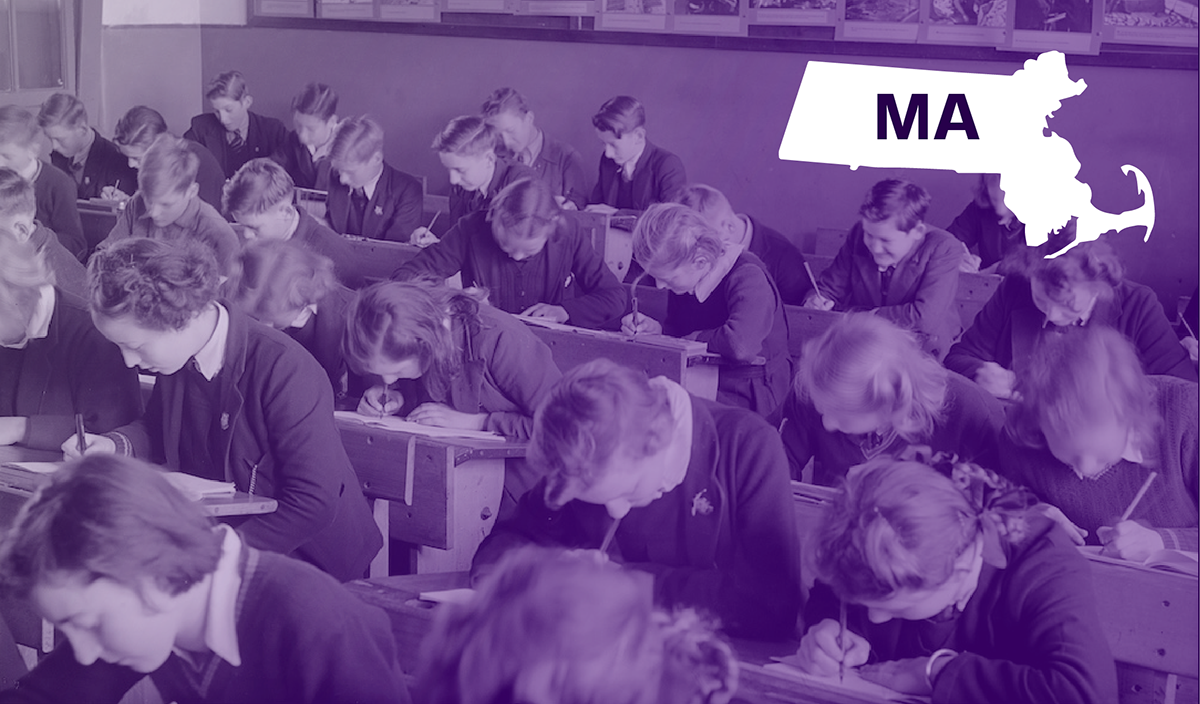New Massachusetts reading initiatives promise to help students — and educators — across the Bay State.
What does that really mean for your school district, your students, and your teachers? What’s the latest on Massachusetts literacy funding?
From Mass Literacy mandates to new Massachusetts Literacy Launch initiatives to grant opportunities, here’s your simple guide to improving reading outcomes in Mass school districts, including:
- What’s ahead for schools and districts throughout the commonwealth in the 25-26 school year
- Important deadlines for districts applying for early literacy state funding
- A look at Massachusetts’ reading rates — and the biggest areas of need
Massachusetts Reading Proficiency — The Good & the Troubling
Before diving into these new initiatives and funding opportunities, it’s important to understand where Massachusetts currently stands in reading achievement — and why these investments are so crucial.
Massachusetts’ reading proficiency scores would seem to tell a rosy tale — after all, the Bay State’s scores are officially the best in the country,
In fact, Massachusetts students have consistently stood out on national tests, and not just in reading.
In 2005, the state was the first to ever see its 4th and 8th graders take the top spots in both reading and math on the National Assessment of Educational Progress (NAEP) test, and Massachusetts reading scores have remained at or near the nation’s best since 1992.
The 2024 NAEP results showed Massachusetts had the highest 4th and 8th grade reading scores of any state.
- 4th grade reading: On a scale of 0 to 500, Massachusetts 4th graders had an average score of 225.
- 8th grade reading: On a scale of 0 to 500, Massachusetts 8th graders had an average score of 268.

Peek beyond first in the nation status, however, and there’s a lot more to the story.
With national reading scores continuing on a decades-long downward trajectory, being at the top still leaves room for growth — a point made by both Massachusetts Secretary of Education Patrick Tutwiler and Massachusetts Governor Maura Healey when the 2024 NAEP scores were released.
While 40% of Massachusetts 4th graders overall scored proficient or above on the 2024 NAEP scores, demographic breakdowns underscored sizable opportunity gaps.
- Just around 20 percent of Black and Latino students and those from low-income households were reading at or above proficiency levels.
- The gap in scores between Massachusetts’ rich and poor students is second largest in the nation.
- Black and Hispanic 4th graders had average scores that were at least 30 points lower than white students.
Reading proficiency rates for Black and Latino students in MA resemble those of students in the lowest-performing states.
Literacy data analysis by the Massachusetts Education Equity Partnership
Massachusetts, along with Arizona, California, Florida, Oregon, and Washington saw a decrease in 4th grade reading scores on the most recent national test. The Commonwealth’s 2024 test results represent the lowest 4th graders have scored in the past decade.
According to analysis by the Education Recovery Scorecard, a project devised by Center for Education Policy Research at Harvard and Stanford’s Educational Opportunity Project, Massachusetts students are now almost half a grade level below 2019 levels on average in reading (.48 grade level equivalents).
Districts across the country are in a similar boat — according to Scorecard, 89 percent of students in districts nationwide are reading below 2019 levels.
“There is more work to do, obviously,” Healey said of early literacy in her state at a press conference in early 2025. “But where other states have continued to see a decline, in Massachusetts the good news is we’ve halted that decline.”
“Progress is slow,” her education secretary added, but Tutwiler said the state is “building a foundation to go fast,” citing investments in initiatives like early literacy learning.
Massachusetts Literacy Launch Initiatives & Grant Deadlines
Formally known as Literacy Launch: Reading Success from Age 3 through Grade 3, the five-year plan to improve early literacy in the commonwealth was introduced by Governor Maura Healey during her State of the Commonwealth address in January 2024. It’s expected to roll out in stages through 2029.
Take a look below to ensure your district doesn’t miss an important deadline.
The Partnership for Reading Success — Massachusetts (PRISM) I grant
What It Is
The PRISM I grant is a continuation grant designed to help local education agencies (LEAs) implement and sustain an evidence-based, culturally and linguistically sustaining multi-tiered system of support for literacy in grades preK–3.
Grant Amount
Approximately $12,300,000 is available to be split among awardees, pending funding in the state budget.
Who’s Eligible to Apply
The 25-26 school year PRISM 1 grant is limited to school districts that were approved for the grant in the 24-25 school year.
How Funding Can Be Used
In year 2 of the program, funding will be available for a host of early literacy improvements, including:
- High-dosage tutoring focused on 1st grade
- Early literacy assessments
- Evidence-based Tier 1 language and literacy instructional materials and/or Tier 2/3 and other supplemental instructional materials (K–3)
Deadline to Apply
June 4, 2025
Literacy Launch Institutes Initiative
What It Is
The Literacy Launch Institutes initiative will provide differentiated professional learning for Massachusetts educators on evidence-based early literacy instruction.
Who Is Eligible
Seats in the institutes are limited with just 600 available for the August 2025 program. Registration is open to individuals and school/district-based teams who are:
- Currently employed Massachusetts public school educators whose work relates to literacy, including general education teachers, special education teachers, ESL or language support teachers, principals, paraprofessionals, literacy coaches, and other school or district administrators whose work relates to literacy in preschool to grade 3
- Massachusetts educator preparation program faculty, staff, and personnel whose work relates to literacy in preschool to grade 3
Educators from community-based preschool programs are invited to attend with an LEA sponsor, and paraeducators can apply to attend as part of a district or school team.
What It Costs
- The professional development will be offered free of charge to educators who are chosen for the program, and some may even qualify for a $500 stipend to cover some of their expenses during the 4-day training period.
- Participants will have the option to purchase two graduate credits after completing the institutes. Offered by Westfield state, the 2 graduate credits will cost $350, a fee that is to be paid by the participant.
Important dates
Seats are open on a first-come, first-serve basis. The first Literacy Launch Institute will be held in Foxboro August 11-15. The second will be offered in Devens August 18-21.
Massachusetts’ Reading Resources Districts Can Turn To
Looking for more resources to improve early literacy in your district? The Massachusetts Ignite Reading team recommends the following:
Tools for Engaging Families
The Mass Literacy Guide released by DESE in 2020 to provide districts with practical strategies and resources for preK-3 literacy has gotten a major overhaul.
Districts can now access a host of tools to share with parents and guardians so they too can support their children’s early reading growth. The guide also includes resources for educators to help answer caregiver questions about evidence-based literacy practices.
Adolescent Literacy Intervention Selection Tool (A-LIST)
The literacy screening mandates implemented across the state in recent years extend only through the 3rd grade, but what about your older students? Massachusetts districts now have a tool to ensure the supports provided for students in grades 4-12 are evidence-based.
DESE launched the A-List, a list of literacy intervention programs for older students that have been reviewed by the department and found to both:
- Align with recommendations from the IES Practice Guide Providing Reading Interventions for Students in Grades 4–9
- Support enactment of culturally and linguistically sustaining practices (CLSP)
Reading Success in One Massachusetts District
One Massachusetts district that has prioritized early literacy intervention has seen the number of fluent readers skyrocket.
Take a peek as educators from Pittsfield Public Schools district share what has been making all the difference for their 1st graders.
About Ignite Reading
Ignite Reading is a DESE-approved provider of 1:1 high-dosage tutoring in foundational literacy skills.
With a team of literacy specialists and highly trained tutors, we provide daily, targeted instruction that quickly closes decoding gaps, so Massachusetts students can successfully make the transition from learning to read to reading to learn.
Content Updated May 30, 2025



